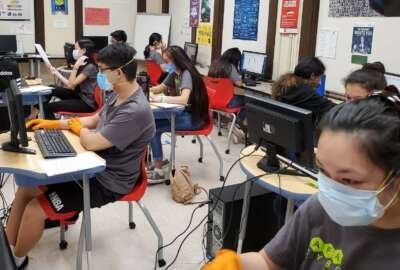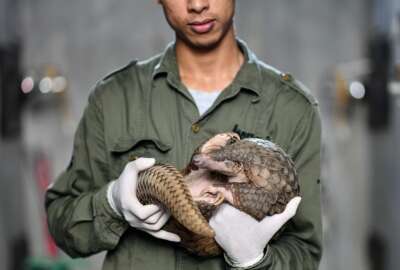State Department has a novel approach to stopping traffic in wildlife
Federal Drive with Tom Temin spoke to Allie Swanson from the Bureau of International Environmental and Scientific Affairs, and to Zoohackathon Program Manager T...
Best listening experience is on Chrome, Firefox or Safari. Subscribe to Federal Drive’s daily audio interviews on Apple Podcasts or PodcastOne.
The State Department is in the midst of an annual month-long program to generate ideas for how to stop trafficking in wildlife. It’s sponsoring Zoohackathon sessions on three continents. For more on what they are and how they work, Federal Drive with Tom Temin spoke to Allie Swanson from the Bureau of International Environmental and Scientific Affairs, and to Zoohackathon Program Manager Tory Peabody.
Interview transcript:
Tom Temin: Well, let’s start with the big picture here: What is the Zoohackathon?
Alexandra “Allie” Swanson: So Zoohackathon is a global competition that brings university students and coders together to develop innovative ideas and solutions to combat wildlife trafficking. This program raises awareness of global wildlife trafficking issues, and inspires the next generation of conservation minded coders. It also aims to build partnerships across the government, private sector and inter governmental stakeholders. And lastly, it strengthens international cooperation in the global fight against wildlife trafficking.
Tom Temin: Well bridge the connection for me between software coding and stopping horrible people with spears and rifles and helicopters that are shooting animals.
Alexandra “Allie” Swanson: So as wildlife traffickers become increasingly sophisticated in the ways that they seek out poaching, or otherwise capturing and treating in animals, we need to become increasingly sophisticated in our ability to combat them. So what Zoohackathon does is it generates innovative ideas for ways in which we can fight wildlife trafficking at all stages from poachers on the ground to preventing poaching from ever happening to helping enforcement detect and interdict traffic, wildlife. But also to reducing demand, because when the demand stops, the killing stops. And so what Zoohackathon does, is it brings together young minds, right? These are university students, sometimes even high school students, but mostly early career professionals to generate innovative ideas, and innovative solutions for combating wildlife trafficking. These don’t have to be super high tech, sometimes low tech is better, especially in remote places. But there are new ways of thinking about how we can solve this problem. And so with Zoohackathon, we generate these ideas and look for ways to support their onward development into fully fledged tech solutions. But one of the biggest outcomes from this event is the fact that we’re bringing people together, most of whom who have never heard of wildlife trafficking, and raising awareness and building this international cooperation and generating the next generation of conservation-minded coders.
Tom Temin: Yes. So can you give us an example of say an idea that an earlier hackathon came up with that is in practice?
Alexandra “Allie” Swanson: Sure. So there are a lot of ideas that have been generated. For example, we have a Chrome plugin, there is something called Conscious Consumer that a team developed to help alert potential buyers you know of products that their products might be problematic or use traffic wildlife products. There’s also a tool that a team from Colombia generated, an idea that would help identify traffic timber, by sort of alerting authorities to irregularities between what you know they were actually carrying, versus what they were claiming to carry. Now, a lot of these ideas are still looking for their ultimate homes. But the teams of young folks who have come up with these ideas continue their professional development in software and engineering. And we continue to look for NGO partners who are interested in taking these ideas onward.
Tom Temin: And these hackathons – there are several of them throughout the world. They’re not just happening at [former] Jurys Hotel at DuPont Circle here. You’ve got people in three continents. Talk about the international aspect of it, Tory?
Victoria “Tory” Peabody: Yeah, so we’re having eight events take place this year, they hit every region of the world except for Europe. We’re kind of having some in-person events. And then we’re having two events that are all virtual taking place across regions. So basically, what we’ve wanted to do is take these new audiences of these university students and coders that really don’t know much about wildlife trafficking. And throughout the program, they essentially learn about these challenges. And then we throw in some fun things like some presentations from wildlife experts, or experts from technology organizations, there’s some quizzes, there’s some really awesome prizes. So it’s a pretty intense weekend. But it’s a lot of fun, and everyone is really excited once the event is over.
Tom Temin: We’re speaking with Tory Peabody, she’s Zoohackathon program manager and with Dr. Allie Swanson, she’s a foreign affairs officer in the Bureau of International Environmental and Scientific Affairs, both at the State Department. And there’s a diplomatic wrinkle in here in that you have events going on in foreign countries, the Congo and so forth, and in Southeast Asian countries. Yet it’s the United States State Department convening, so there must be a hosting function that happens from those countries so that you don’t feel like interlopers, in an eternal problem of another country.
Alexandra “Allie” Swanson: Yeah, absolutely. So countries that are hosting these Zoohackathons are often very receptive to joint efforts to combat wildlife trafficking. And we sometimes have whose government participation in our events. This was especially true when we had in-person events. But sometimes the embassies that are leading the sort of local Zoohackathon programs will engage with government partners to help identify problems that are most pressing locally, and that resonate the most with local communities. I think this was true in the Colombia event a couple of years ago, right, the embassy engaged with the host government to identify what are the biggest issues that we can help jointly address? So I think one of the key outcomes, too, of these Zoohackathon events is that they build this international cooperation because no one can fight wildlife trafficking alone. This is an international effort, it’s a global issue. And through Zoohackathon, we’re able to build that international cooperation and work together on these issues.
Victoria “Tory” Peabody: And then also just to chime in, sometimes representatives from the local governments will participate on the judging panel, because the participants throughout the event will create a solution idea. And then at the end of the event, they are supposed to pitch their solution idea to a panel of judges. So that’s also another really cool opportunity for the local governments to participate. And then they can kind of provide their input on the ideas as well.
Tom Temin: Not every government involved here has, let’s say, exactly the same level of integrity say that the U.S. government does. Animal trafficking can be an economic driver in some of these countries. So you have to know the government is not in cahoots with the traffickers. And that’s not an unknown phenomenon around the world. So how do you tread that one, and also the people participating could come into the crosshairs of the traffickers, who are often violent people?
Alexandra “Allie” Swanson:So our experiences with Zoohackathon have always been a very cooperative and positive experience with our host governments. I think that, as we know, through the process of identifying countries of concern under the Eliminate, Neutralize and Disrupt (END) Wildlife Trafficking Act, government complicity and engagement in and benefit from wildlife trafficking is a real concern that the U.S. does seek to address through various channels. We have the END Act in which we call up countries of concern, and we also have these ineligibility programs in which we identify known traffickers to send a strong signal that they’re not welcome in the United States. But we also have bilateral and regional cooperation and building those positive cooperative processes. And this sort of history of cooperation is really important to arriving at a positive outcome. And with Zoohackathon, the way that people participate in Zoohackathon has not raised concerns about retaliation. The violence against environmental defenders is a very real thing, and that is something that State Department recognizes in their processes for addressing that and recognizing that. But because with Zoohackathon, we’re engaging in new ideas, and none of these participants are like going undercover or calling out criminals, it has remained a very positive avenue for cooperation. And I think that’s sort of where its strength lies is this ability to cooperate and be positive on this shared goal.
Tom Temin: Alright, and just out of curiosity, what are the top animals that are trafficked in some of the countries – Bolivia, the Congo, Gabon, Saudi Arabia, Uganda, Vietnam – what species are we most concerned about?
Alexandra “Allie” Swanson: Globally it’s pangolins. Pangolins are the most trafficked mammal in the world in particular for their scales, which are used in traditional Chinese medicine. In the countries you’ve mentioned, the issue is very place-to-place. So in Latin America, broadly, live bird trade is a huge issue as well as live reptile trade. There’s a lot of convergence or sort of laundering of wild caught animals, trafficked animals through the “legal captive trade,” right. So and that can make it very hard to discern what’s legal and not. African elephants for their ivory is long-recognized sort of classic emblem of the fight against wildlife trafficking. Cheetahs are another, I think, rising example, especially going into the Middle East for pet trade. It varies widely.
Tom Temin: Well, we’re glad you’re on the job. Dr. Allie Swanson is a foreign affairs officer in the Bureau of International Environmental and Scientific Affairs at the State Department. And Tory Peabody is a Zoohackathon program manager. Thank you both very much.
Copyright © 2024 Federal News Network. All rights reserved. This website is not intended for users located within the European Economic Area.
Tom Temin is host of the Federal Drive and has been providing insight on federal technology and management issues for more than 30 years.
Follow @tteminWFED






